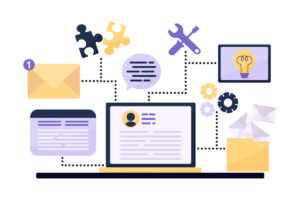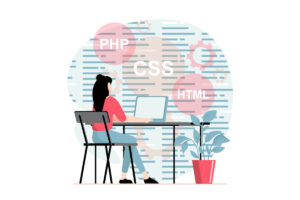In the digital age, E-commerce has surged to the forefront of the retail sector, revolutionizing how businesses sell and consumers purchase products. Among the technologies driving this transformation, PHP remains a pivotal player, offering robust, scalable, and efficient solutions. This comprehensive guide explores the depths of E-commerce solutions with PHP, providing a roadmap for building scalable online stores that can grow alongside your business.
Getting Started with E-commerce Solutions Using PHP
1. E-commerce Platforms Built with PHP
PHP is at the heart of many leading E-commerce platforms such as Magento, WooCommerce, and PrestaShop. These platforms cater to stores of all sizes with their flexible features. Magento stands out for scalability, while WooCommerce on WordPress excels in ease of use and customization. PrestaShop stands out for its rich functionality straight out of the box. Selecting the right platform hinges on your unique business needs, including product complexity, anticipated traffic, and customization requirements.
2. Custom E-commerce Store Development with PHP
For businesses seeking tailor-made solutions, custom E-commerce store development with PHP presents a viable option. Planning your E-commerce store entails outlining your business model, product range, and expected traffic. Designing a scalable database schema and implementing MVC architecture ensures your store can handle growth and complexity efficiently. These foundational steps pave the way for a customized shopping experience that stands out in the competitive digital marketplace.
3. Integrating Key E-commerce Features
Key features like product management, shopping carts, and secure payment gateways are vital for online store success. E-commerce solutions with PHP support the seamless incorporation of these elements, offering a user-friendly experience to customers while maintaining high security and functionality standards. Additionally, adhering to security best practices is paramount in protecting user data and building trust with your customers.
4. Optimizing PHP E-commerce Stores for Performance and Scalability
Optimization is key to sustaining high traffic and ensuring smooth store operation. PHP E-commerce solutions benefit significantly from performance optimization techniques, scalable infrastructure planning, and the strategic use of caching and CDNs. These efforts reduce load times, improve user experience, and enhance search engine rankings, contributing to higher traffic and sales.
5. Future Trends in E-commerce Development with PHP
The future of E-commerce solutions with PHP is bright, with emerging technologies like AI and machine learning set to redefine the shopping experience. These technologies can significantly impact personalized shopping, predictive analytics, and automated customer service, providing businesses with unique customer engagement opportunities.
- Personalized User Experiences: Using AI to analyze customer data allows online stores to offer personalized product recommendations and promotions based on individual preferences and browsing history.
- Chatbots and Automated Customer Service: Integrating AI chatbots for instant customer service enhances shopping experiences by efficiently resolving queries.
- Enhanced Security with Blockchain: Utilizing blockchain technology to enhance transaction security, reduce fraud, and ensure the integrity of payment systems.
- Voice Search Optimization: Adapting e-commerce platforms for voice search to cater to the rising use of voice-activated assistants, making it easier for customers to find and purchase products using voice commands.
- Augmented Reality (AR) Shopping: Incorporating AR technology to offer virtual try-ons and product previews, giving customers a better understanding of products before making a purchase.
- Predictive Analytics for Inventory Management: Using machine learning algorithms to predict sales trends and optimize inventory management, reducing overstock and out-of-stock scenarios.
6. Getting Started with Your PHP E-commerce Store
Launching your first PHP E-commerce store can feel overwhelming, but with a clear guide and the right resources, it’s achievable. Each step, from platform selection to feature integration and performance optimization, contributes to your online success.
- Choose a PHP E-commerce Platform: Choose a PHP platform tailored to your business needs, weighing factors such as scalability, security, and usability. Options like Magento, WooCommerce (for WordPress), and PrestaShop are popular picks.
- Secure a Domain Name and Hosting: Purchase a domain name that reflects your brand and secure reliable hosting with strong uptime records and customer support. Look for hosts that specialize in PHP code and offer seamless integration with your chosen e-commerce platform.
- Customize Your Store’s Design: Utilize the themes and customization options available on your platform to create a store that aligns with your brand identity. Pay special attention to user experience (UX) elements, ensuring that your site is easy to navigate.
- Add Your Products: Carefully list your products, including high-quality images and detailed descriptions.
- Set Up Payment Processing: Integrate secure payment gateways that offer customers a range of payment options, including credit cards, PayPal, and other online payment methods.
- Implement SEO Best Practices: Optimize your store for search engines by using relevant keywords, creating quality content, and ensuring your website has a mobile-friendly design.
- Launch Marketing Campaigns: Develop a marketing strategy encompassing email marketing, social media, and pay-per-click (PPC) advertisements to attract and retain customers.
- Analyze and Optimize: Utilize analytics tools to monitor your store’s performance. Pay attention to metrics like visitor numbers, conversion rates, and bounce rates.
- Stay Updated with E-commerce Trends: E-commerce is a rapidly evolving field. Keep your store competitive and appealing by staying updated on new technologies, customer preferences, and market trends.
Conclusion
E-commerce solutions with PHP offer a powerful, flexible foundation for building and scaling online stores. From choosing the right platform to integrating advanced technologies, the potential for growth and innovation is boundless. We encourage businesses to explore PHP E-commerce development, leveraging the insights and best practices shared in this guide to carve out their success in the thriving digital marketplace.
Ready to enhance your e-commerce with PHP? Contact us to discuss how our PHP e-commerce solutions can boost your online store. Let’s work together to elevate your performance and customer experience.












+ There are no comments
Add yours